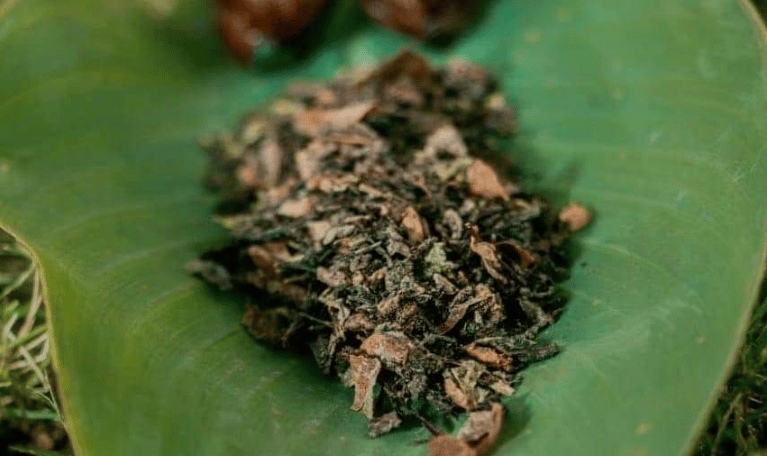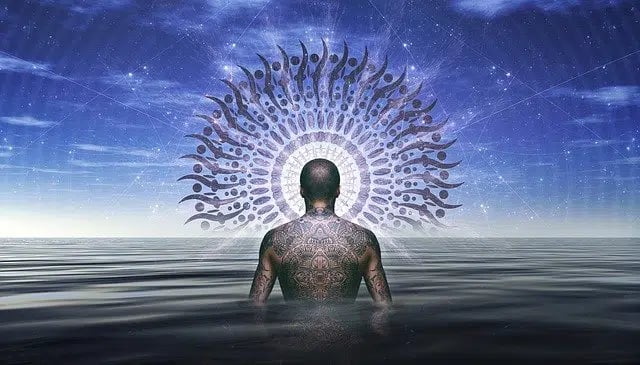Changa
Changa is an herbal blend containing dimethyltryptamine (DMT), a powerful entheogen known to induce profound visionary experiences. Changa is typically composed of leaves from plants containing monoamine oxidase inhibitors (MAOIs), such as Banisteriopsis caapi, mixed with DMT extracted from plants such as Mimosa hostilis or Acacia. This combination allows DMT to be more easily absorbed and prolongs the duration of its effects.
How do you consume Changa?
Changa is usually smoked or vaporized. Here we explain the process:
Preparation: Changa generally comes in the form of a dry mixture, ready to be smoked. It can be rolled into a cigarette (joint), smoked in a pipe, or vaporized using a suitable vaporizer.
Inhalation: When smoking or vaporizing changa, it is important to inhale deeply and hold the smoke or vapor in your lungs for several seconds to maximize DMT absorption.
Dosage: The amount to smoke can vary, but generally an effective dose is between 25 and 50 mg of changa, depending on the concentration of DMT in the mixture and the user's experience.




Effects of Changa
The changa experience can be intense and varied, with effects that usually begin quickly and can last between 10 and 30 minutes. The most common effects include:
Visuals: Bright colors, geometric patterns, and visions of landscapes or spiritual beings.
Cognitive: Alterations in the perception of time and space, and a sense of transcendence or connection with the universe.
Emotional: Deep introspection, feelings of love, peace and sometimes confrontation with fears or internal traumas.
Physical: Sensation of energy in the body, tingling, or a slight dissociation from the body
Benefits of Changa
Despite the risks, changa also offers numerous potential benefits:
Emotional Healing: Can help release past traumas, fears and emotional blocks, promoting greater mental and emotional health.
Spiritual Growth: Facilitates mystical experiences and a deep connection with the divine, helping individuals find purpose and meaning in their lives.
Self-exploration: Helps users better understand their thinking and behavioral patterns, encouraging self-awareness and self-acceptance.
Therapeutic Benefits: Although more research is needed, some users report improvements in conditions such as depression and anxiety after experiences with changa
Risks of Changa
Although changa can offer transformative experiences, it also carries certain risks:
Psychological Intensity: Experiences can be extremely intense and challenging, causing anxiety, fear, or confusion. In rare cases, it can trigger psychotic episodes in predisposed people.
Drug Interactions: Changa can interact negatively with certain medications, especially antidepressants and other psychotropic drugs. It is crucial to avoid these combinations to prevent adverse effects.
Health Contraindications: People with heart conditions, hypertension or serious mental disorders should refrain from using changa without the supervision of a health professional.
General considerations
To ensure a safe and beneficial experience with changa, it is important to keep the following considerations in mind:
Clear Intention: Having a clear, positive intention for the session can enrich the experience and provide focus during the journey.
Post-Session Integration: Having support to process and integrate the teachings and revelations received is crucial. This may include therapy, support groups, or ongoing spiritual practices.
Medical Consultation: Consult with a health professional before using changa, if you take medications or have pre-existing health conditions
.
Conclusion
Changa is a powerful tool for personal and spiritual transformation. With a proper understanding of what it is, how it is taken, its effects, risks and benefits, you can better prepare yourself for an experience that can offer profound revelations and healing. If you decide to embark on this journey, do so with respect, preparation, and the right support to take full advantage of its benefits.
